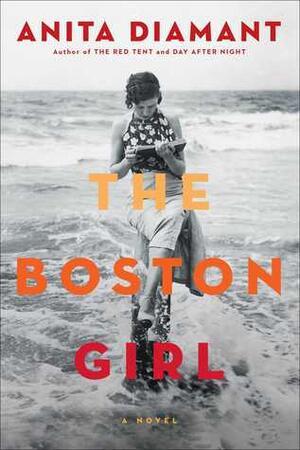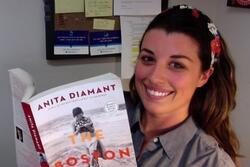Q&A with Anita Diamant
Welcome to the JWA Book Club! We are excited to gather today to discuss Anita Diamant's new novel, The Boston Girl.
When taking part in our comment-based discussion below, remember to hit "Show Reply" and "Show New Comments" to see the full conversation! Anita Diamant will be responding to questions mainly through the "reply" feature.







In reply to <p>The relationships between by IlanaB
Very biblical--look at how children in Torah are treated so differently one from the other.
In reply to <p>Very biblical--look at how by Ricki Henschel
Good point, Ricki!
In reply to <p>Very biblical--look at how by Ricki Henschel
Yes! I love this point. An archetype/trope that feels very relatable. It feels very "Jewish" too, but maybe it is really all kinds of families are this way?
In reply to <p>The relationships between by IlanaB
Her relationship with Addie is most fraught because she is American from the get-go. But I do think that temperament plays a big role in how people respond to hardship. Betty got out, after all. But eventually she could let Mameh's comments wash over her. Betty has an ego made of steel. I know people like that
In reply to <p>Her relationship with by Anita Diamant
And Betty served as a buffer for Addie-- struck out on her own first, was a role model for doing it different, and was a role model for playing on the floor with her kids.
In reply to <p>And Betty served as a by srsilverjd
Exactly. The oldest daughter, the risk-taker, the one who makes it in America and becomes a Hadassah lady. (which is a good thing!)
In reply to <p>Exactly. The oldest by Anita Diamant
Hadassah--That's how you know you've made it! :-)
In reply to <p>Hadassah--That's how you by Etta King
My mom, born in Poland, was a lifetime Hadassah member and I never knew that until she died..I knew all of her synagogue friends and they were pat of our broader family, but never met her Hadassah friends until her funeral. That was more than 10 years ago and I am still digesting that. I am a lifetime member now, as are my three girls.
In reply to <p>The relationships between by IlanaB
Yes! Thanks for bringing this up. I love that as readers, we could empathize with ALL of them, and at times with Mameh, too. The dynamic felt complicated, and very real.
In reply to <p>Yes! Thanks for bringing by Etta King
Right, even though Mameh was a tough character, I felt that she was still empathetic.
In reply to <p>Right, even though Mameh by Tara M.
I found myself thinking "could I ever be like this? have I ever been like this?" while I was reading and I decided the answer was yes.
In reply to <p>I found myself thinking by Etta King
I agree. could I have been that strong a young woman?
In reply to <p>Yes! Thanks for bringing by Etta King
And to me she was someone in so much pain that she couldn't even begin to imagine change of heart even as she changed physical location.
In reply to <p>And to me she was someone by Ricki Henschel
I think her pain was what drove her.
In reply to <p>I think her pain was what by Anita Diamant
Anita -- drove her to what? Do you mean what colored her existence?
In reply to <p>Anita -- drove her to what by srsilverjd
Colored her existence. Also fear, which is corrosive. She lived a life of saying "no," which is a tough way to live
In reply to <p>Colored her existence. by Anita Diamant
Hmm. I hadn't thought about that before.
I found the history of some of the institutions in Boston fascinating. I was also intrigued by the inclusion of "Orphan Trains" as my book group here in NJ has read & discussed "The Chaperone", and will soon read "The Orphan Train".
In reply to <p>I found the history of by MiriamEichler
that's really interesting--they're suddenly popping up in so many novels! what role did orphan trains play in "the chaperone"?
In reply to <p>that's really interesting- by Tara M.
As I recall, the chaperone in the story had been sent to Kansas on an orphan train as a child. When she agrees to accompany a young, would-be starlet from Wichita to NYC, she attempts to pursue her roots.
In reply to <p>I found the history of by MiriamEichler
Orphan Train is a good read--and an important part of our history to understand
In reply to <p>I found the history of by MiriamEichler
The history of the influenza epidemic, too, which I hadn't thought about in quite some time.
In reply to <p>The history of the by Erika Dreifus
What amazed me was reading about how nobody talked about it when it was over. Like it was a bad dream
In reply to <p>What amazed me was reading by Anita Diamant
Really? That seems crazy. I wonder what it is like in more contemporary communities that have been impacted by widespread illness, like Ebola. Does anyone know if there have been oral histories or story collecting projects in communities effected by that health disaster?
In reply to <p>What amazed me was reading by Anita Diamant
Having worked in the world of medicine for 35 years, I am surprised by your comment that no one talked about it. It is something that is still, a century later, is in discussion among public health physicians and others in medicine and concerns about how it affected people around the world. Some statistics show that more died of the 1918 influenza than those wounded in WWI.
In reply to <p>Having worked in the world by sukir49md
That's in the professional world. So many people only found out years and years later that grandma or aunt so-an-so died of flu. Sometimes only by making the connection by the date. And yes, more Americans died of flu than in WW1
In reply to <p>What amazed me was reading by Anita Diamant
Important for us to realize the difference we have in treating the flu today.
In reply to <p>What amazed me was reading by Anita Diamant
It was a nightmare that did end. I'm sure you remember when we did not talk about cancer, as it was a death sentence, and in too much of our society we still don't talk about mental disease...that which destroys us that we don't understand is difficult to talk about, I think.
In reply to <p>The history of the by Erika Dreifus
Very timely today, when the issue of anti-innoculations could give rise to other new epidemics.
In reply to <p>I found the history of by MiriamEichler
http://www.pbs.org/wgbh/amex/o...
In reply to <p><a href="http://www.pbs by Tara M.
About the Orphan Trains?
In reply to <p>I found the history of by MiriamEichler
I have read "Orphan Trains" and loved it. My book group is reading it for May.
I was struck by the tension between mameh and Addie, how Addie stuck by her mom, how there was never a resolution, and then how Addie led such a productive life despite the fundamental disconnect.
In reply to <p>I was struck by the by srsilverjd
I loved that she learned to be her own person, through her friendships and those she chose as family, and that she struggled and was saddeneed and always felt a loss due to her inability to connect with her mother...but she had what some call today "grounded hope" that kept her going. That spoke to me.
In reply to <p>I loved that she learned by Ricki Henschel
"Grounded hope." Nice phrase. What does it mean?
In reply to <p>"Grounded hope." Nice by Anita Diamant
There is a new book out called Super Survivors that looks at individuals who survive life threatening events, from almost lynchings to war to cancer and more. What the researchers found is that those who survived had in common what they called grounded hope, which is not a positive attitude but the ability to believe that there are options and they could work to make them happen. Certainly not all who have grounded hope survive, but all of these individuals shared that basic life philosophy. It is a good read and an intersting perspective.
In reply to <p>There is a new book out by Ricki Henschel
thank you
In reply to <p>I loved that she learned by Ricki Henschel
Me too, Ricki.
In reply to <p>I was struck by the by srsilverjd
The tension between old world and new world plays out. But Mameh is damaged by the terrible losses she suffers, too. Addie finds support and guidance from many mentors, starting with Edith Guerrier. Many people can name people like that who changed their lives.
Erika, we are having enough trouble handling it today. I imagine historically the city would have just been one of walkers. Perhaps horsedrawn carriages would have been helpful.
In reply to <p>Erika, we are having by IlanaB
carriages full of snow...
Can you talk about your thoughts inluding addressing depression and suicide?
In reply to <p>Can you talk about your by Ricki Henschel
The immigrant experience is so often described positively.I think among Jews in particular. But coming to American was devastating for some, who never adjusted. Some just kept within doors or their own small communities, others succumbed to despair.
Anita, was there anything that you decided or otherwise had to leave out from this story--historical or more personal to Addie--that you can share with us now?
In reply to <p>Anita, was there anything by Erika Dreifus
I left TONS of stuff on the cutting room floor, but that always happens with historical research. I was fascinated by the women who worked at Simmons College, Women's Industrial and Educational Union, Crittenton, the settlement houses. A whole interlocking directorate of progressive era women. Some wealthy, some middle class
In reply to <p>I left TONS of stuff on by Anita Diamant
Yes, I thought Gussie probably had a very interesting story to tell, herself! Was she based on a real figure, btw?
In reply to <p>Yes, I thought Gussie by Erika Dreifus
Gussie was a composite of several women. Grandmothers of friends, a trustee of Rockport Lodge into the 1980s. And I had to so something with my discovery of the Portia School of Law (now New England School of Law) an all female school that had night classes and immigrant students
In reply to <p>I left TONS of stuff on by Anita Diamant
I was FASCINATED with settlement houses as a kid. Lillian Wald is a Jewish woman who was very involved in the settlement house movement and the beginnings of social work. I also love the examples of women working together across classes from this time period that we don't see (or at least talk about) as much today. The Women's Trade Union League was a great example of that. The upper class women that joined the strike lines were sometimes called "The Mink Brigade" because they wore furs on the picket line. Love it. Here is a picture of women from the WTUL at the Uprising of the 20,000 in 1909. http://www.laborarts.org/exhib...
In reply to <p>I was FASCINATED with by Etta King
Etta, thanks for posting this. I love that women of all classes had political issues that drew them together.
In reply to <p>I was FASCINATED with by Etta King
Etta. I gotta get some of these photos. Can we talk later?